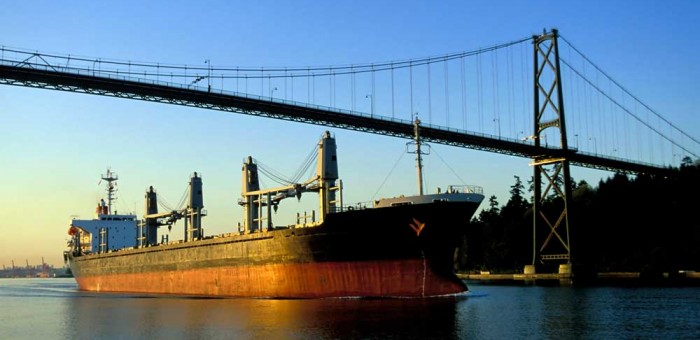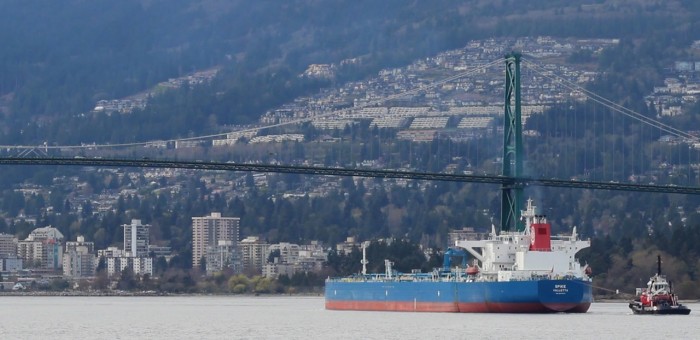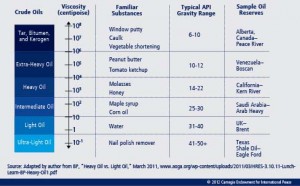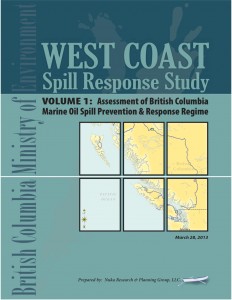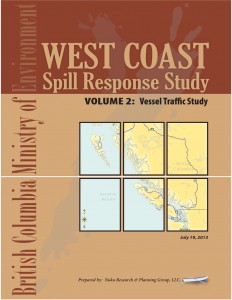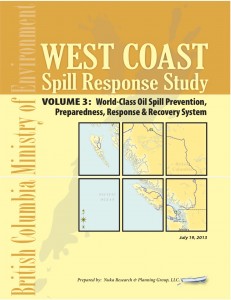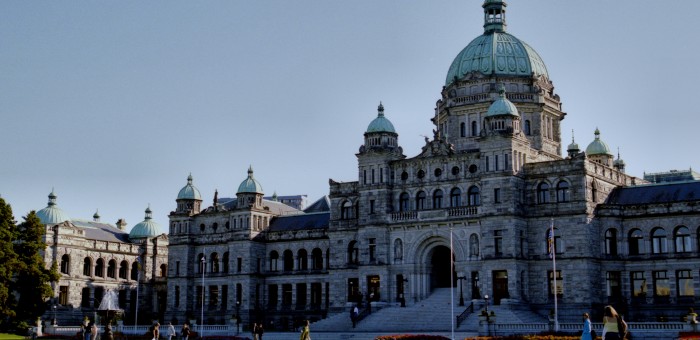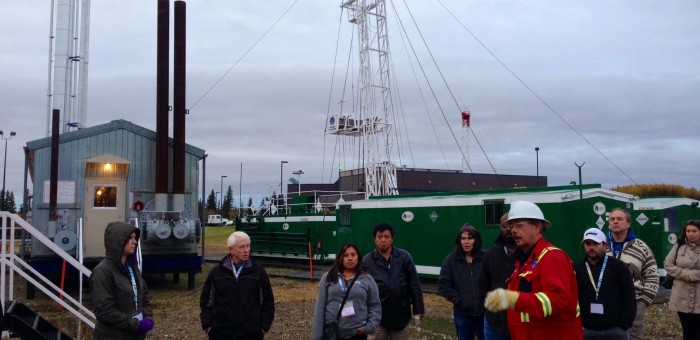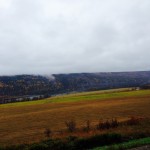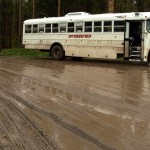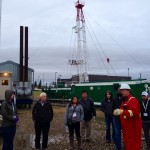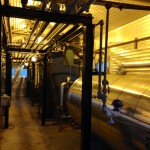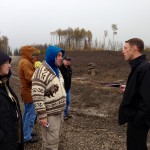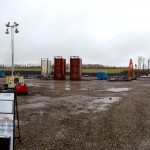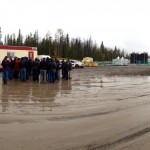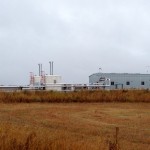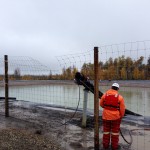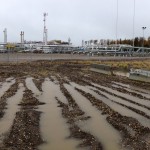Heavy Oil Pipelines: Facts, Questions and My Assessment
Facts and Questions
Fact 1: Currently, 300,000 barrels of heavy oil are transported across B.C. in Kinder Morgan’s Trans Mountain pipeline each day. Kinder Morgan plans to nearly triple this capacity while Enbridge has applied to build a new pipeline to the west coast. If approved, the two pipelines would increase the amount of heavy oil coming to our coast to a total of 1,415,000 barrels per day. In addition to the pipeline proposals, rail options are also being considered to transport up to 525,000 barrels of heavy oil to the B.C. coast each day.
Fact 2: According to (1) Premier Christy Clark, (2) the reports commissioned by the Ministry of the Environment and (3) the Province’s submission to the Joint Review Panel on the Northern Gateway Pipeline, British Columbia is woefully unprepared for a heavy oil spill. The Province’s submission also states that regardless of whether or not additional resources are committed, effective spill response is “impossible or severely constrained” in certain regions of the province.
Comment: I applaud the Premier for being consistent in requiring five conditions to be met before supporting enhanced heavy oil tanker traffic on the coast. I also applaud her for publicly recognizing the fact that B.C. is woefully unprepared for a heavy oil spill. Yet at the same time as the Premier is recognizing this, she is also signalling that progress is being made in meetings with Alberta Premier Alison Redford towards meeting her government’s five conditions.
My concern is that because global knowledge of diluted bitumen is so limited, the government’s current standard of “world-leading” is actually a very low standard that, frankly speaking, could easily be met without ever developing a truly effective spill response capacity. In other words, “world-leading” standards will not protect our coast from a heavy oil spill. I have therefore asked the Premier in an open letter to clarify what criteria her government uses to evaluate a “world-leading” or “effective” spill response capacity. Only by having this information can we make a fully informed choice about whether the likely benefits outweigh the enormous risks.
Fact 3: Proposals to build refineries that can turn bitumen into value-added products prior to export are already being considered in both B.C. and Alberta. Proponents of these refineries argue that it would stimulate more investment and jobs here in Canada, meaning we would exact greater gains from our limited natural resources.
Fact 4: Refined oils are, comparatively speaking, much safer to transport than diluted bitumen. There is significantly more knowledge of how to clean up refined oils, including existing procedures, protocols, equipment and expertise. According to documents from the Department of Fisheries and Oceans (DFO), this knowledge does not currently exist for bitumen, meaning it is much more dangerous to transport.
Comment: The plan to transport diluted bitumen by pipeline across B.C. for export to international markets is both environmentally risky and economically short-sited. It is looking for the quick dollar at the expense of a potentially bigger dollar—and our environment.
If we are going to continue developing the Alberta oil sands, and if oil sands products are going to be transported across B.C., then shouldn’t we seriously consider exporting refined products like gasoline and jet-fuel instead of diluted bitumen?
Refined products could sell for higher prices and stimulate the development of value-added industries (including petrochemical industries). Exporting refined, as opposed to raw, products could create more local jobs in Canada while eliminating the risk of a dilbit spill on our coastline. Taking this further, refining bitumen close to where it is extracted would also minimize the risk of a land-based dilbit spill from a leaking pipeline.
My Assessment
The threat of a heavy oil spill on the B.C. coast is not a distant possibility. Tankers leave from Vancouver habour ever week and if the Northern Gateway and Trans Mountain pipeline proposals are approved, the number of tankers will increase dramatically.
Some risks are necessary; others are not. While Premier Christy Clark has publicly recognized that B.C. is “woefully” unprepared for a heavy oil spill, the Province’s submission to the Joint Review Panel for the Northern Gateway pipeline has clearly stated that effective spill response is “impossible or severely constrained” in certain regions of the province. Meanwhile, the Department of Fisheries and Oceans has made it clear that not enough is known about what would happen to diluted bitumen were it to spill into the ocean.
The chances that a heavy oil spill will occur may be small, but the risks are massive—not just the environmental risks but also the economic risks. What would happen to the tourism or fishery industries if there was a spill in or near Vancouver habour?
The more we increase the number of heavy oil tankers, the higher the chance that a spill will occur. We need to be smart about how we manage this risk and to recognize that, in some cases, if we cannot manage the risk, we should not be shipping the product.
I have therefore proposed two ideas:
- I have called for a moratorium on tankers carrying diluted bitumen on the B.C. coast.
- I have proposed that if we are going to continue developing the Alberta oil sands, and if that oil is going to cross B.C., then at the very least, we should seriously consider refining it into value-added products prior to transportation and export, in order to increase the economic benefits and decrease the environmental risks.
Further Reading
Christy Clark’s statement to Mansbridge: http://www.cbc.ca/news/politics/christy-clark-warns-canada-unprepared-for-tanker-oil-spills-1.1876514
Five conditions for heavy oil pipelines: http://www.newsroom.gov.bc.ca/2012/07/british-columbia-outlines-requirements-for-heavy-oil-pipeline-consideration.html
Spill response reports: http://www.env.gov.bc.ca/main/west-coast-spill-response-study/
Province’s submission on Northern Gateway: http://www.env.gov.bc.ca/main/docs/2013/BC-Submission-to-NGP-JointReviewPanel_130531.pdf
Oil by rail: http://www.cbc.ca/news/canada/british-columbia/cn-feds-eyeing-oil-by-rail-to-prince-rupert-b-c-1.1863916
Heavy Oil Pipelines: Background
With the development of the Alberta oil sands, the Federal government and stakeholders in the oil sands industry have been looking for new heavy oil export opportunities. One path that is under consideration is to transport heavy oil across British Columbia for shipment by tanker to international refineries.
There are two major heavy oil pipeline proposals that are being considered in British Columbia. The first is the Northern Gateway Pipeline, proposed by Enbridge. This pipeline would run 1,177km from Northern Alberta to the port of Kitimat, B.C. and would transport up to 525,000 barrels of heavy oil per day. The second proposal is an expansion of Kinder Morgan’s existing Trans Mountain Pipeline, which runs 1,150 km from Strathcona Country, AB, to Burnaby, BC. The expansion would increase the carrying capacity of the pipeline from 300,000 barrels per day, to 890,000 barrels per day.
One of the key concerns with these pipeline projects is that the type of oil that will be transported is not traditional crude oil. Instead, the heavy oil that would be transported is called “diluted bitumen” or “dilbit”. Bitumen by itself is very viscous (like window putty, caulk or vegetable shortening) and so does not flow through pipes. As such, it is mixed with condensates (other very light hydrocarbons) with an API (American Petroleum Institute) gravity range of typically >50 (see Figure 1). Unlike traditional crude oils, bitumen is heavier than water that, by definition, has an API gravity equal to 10 (see Figure). What this means is whereas traditional crude oil will largely float on the surface of the ocean in the event of a spill, up to 50% of dilbit would sink (particularly in the presence of suspended particles in the water column), making it much more difficult to clean up. Traditional oil spill recovery techniques will not work nearly as effectively on dilbit and our current knowledge of what happens to the portion of dilbit that sinks is severely limited. One therefore needs to make a clear distinction between dilbit and other crude oils.
Figure 1: Typical density of a variety of oils characterized using the American Petroleum Institute (API) gravity scale. Water is measured as 10 so numbers <10 are heavier than water and numbers >10 are lighter than water. Source: http://carnegieendowment.org/2012/12/18/carbon-contained-in-global-oils/euzi#
In response to the public backlash against these pipeline projects, the Liberal government announced 5 conditions that will guide BC’s approval of any new heavy oil pipeline. The conditions are as follows:
1. Successful completion of the formal environmental review processes.
2. World-leading marine oil spill response, prevention and recovery systems for British Columbia.
3. World-leading practices for land spill prevention, response and recovery systems for British Columbia.
4. Legal requirements regarding Aboriginal and treaty rights must be addressed and First Nations be provided with the opportunities to benefit from these projects.
5. British Columbia receives a fair share of the fiscal and economic benefits of proposed heavy oil projects that reflect the risk borne by the province.
The BC government, however, has yet to outline the specific criteria that it will use to evaluate the extent to which these conditions are met. For instance, what is the maximum allowable response time to a spill under condition three? Or what percentage of heavy oil must be recovered from a marine spill to satisfy condition two? Nevertheless, the BC government has released three comprehensive reports providing: 1) an Assessment of British Columbia Marine Oil Spill Prevention & Response Regime; 2) a past and potential future Vessel Traffic Study; 3) an assessment of what one World-Class Oil Spill Prevention, Preparedness, Response & Recovery System might look like.
Figure 2: Three volumes of the West Coast Spill Response Study (click on image to load report).
In addition to the environmental considerations, there are also economic questions that have yet to be fully addressed. Could British Columbia, Alberta and Canada more generally benefit more from refining the oil here at home, rather than simply selling off our raw resources?
The Joint Review Panel that has been considering the Northern Gateway proposal is due to submit its report to the Federal Government in December 2013. Meanwhile, Kinder Morgan is currently finalizing its submission to the National Energy Board for the Trans Mountain Pipeline Expansion project. Once the assessments are completed, it will be up to the Federal Government to decide whether or not to approve the projects.
B.C. Government to Apologize to Chinese Community for Historic Wrongs
Andrew Weaver commends the Government of British Columbia for announcing today that it will launch a consultation process to discuss the wording of a formal government apology to B.C.’s Chinese community for historical wrongs.
In making this announcement, the government has acknowledged that for more than 60 years, from 1885 to 1947 the Chinese community in B.C. suffered legislated inequality and discrimination, most notably under the Chinese Immigration Act and Chinese Exclusion Act.
Over the coming months, Teresa Wat, Minister of International Trade and Minister Responsible for the Asia Pacific Strategy and Multiculturalism will travel to communities throughout the province to consult with Chinese community associations and citizens to identify appropriate wording for a formal apology.
Andrew Weaver applauds the B.C. government for taking the necessary steps to recognize and apologize for these past wrong-doings and looks forward to supporting Minister Wat as she meets with Chinese cultural groups in Oak Bay and Gordon Head.
The Chinese community has been an integral part of Oak Bay and Gordon Head for over 100 years and has contributed significantly to the development of our community’s rich and vibrant cultural history. The Chinese Cemetery is one of many examples of this. In 1903 the Chinese Consolidated Benevolent Association purchased 3.5 acres of land at Harling Point in Oak Bay and established the Chinese Cemetery. Today the cemetery hosts the remains of hundreds of Chinese-Canadian pioneers and in 1994 was declared a National Historic Site by the Government of Canada.
If you would like to contribute your recommendations regarding the wording of the formal apology, please call my office at 250-472-8528 or send me an email.
Apply for the BC Youth Parliament
The British Columbia Youth Parliament’s 85th Parliament will be held in Victoria at the Provincial Legislative Chambers from December 27 to 31, 2013. The Youth Parliament is a province-wide non-partisan organization for young people ages 16 to 21. It teaches citizenship skills through participation in the December parliamentary session and in community service activities throughout the year. Youth Parliament is a one year commitment.
The BC Youth Parliament is non-partisan, and applicants need only be interested in learning more about the parliamentary process and in serving their community.
The application form is available here, along with an informational brochure and poster.
All application forms must be received by October 23, 2013. Selected applicants will be notified in early November. For more information, please click here.
Touring the Natural Gas Fields in Fort St. John
This week Andrew Weaver is in Fort St. John for the BC Energy Conference. The conference brings together industry leaders, government representatives, and academics to generate awareness and general literacy relating to the energy sector in Canada, and particularly relating to the natural gas sector which is prominent in this region.
Andrew Weaver has raised serious concerns about the government’s plan to develop a liquefied natural gas sector in British Columbia. This conference serves as another helpful step in ensuring that he can continue to offer an informed and constructive voice to the debate.
The first day of the conference was spent touring some of the nearby natural gas facilities. Below are a few of the highlights.
- The Peace River valley
- The buses that transported us between sites
- Touring a training site at Northern Lights College
- Inside the training site at Northern Lights College
- Questions on the tour
- A drilling site
- Learning about hydraulic fracturing
- A site undergoing hydraulic fracturing
- A natural gas rig
- Touring the camp
- A water storage site
- A close up of the water storage site
- A gas plant that ties into a transmission line
- The Peace River valley

